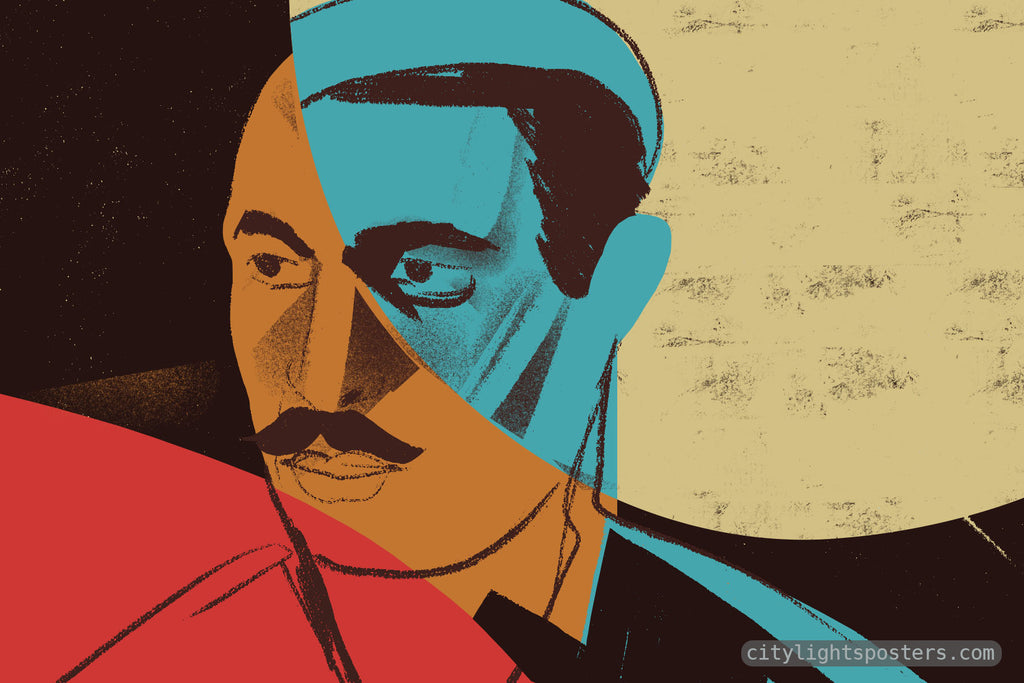The Doorman, the President, and the Soldier: The Many Faces of Ahmed Zaki in Egyptian Film Posters

By Ashraf Swelim
Ahmed Zaki (1949-2005) appeared in over 50 Egyptian movies, beginning with his debut in My Son (1972) and ending with the posthumous release of Halim (2006). Zaki's remarkable legacy is indisputable: he was a versatile performer who excelled at playing a wide variety of characters that differed in both nature and appearance. In his career, he portrayed political heavyweights (president, minister), artistic souls (singer, painter, photographer, director), gifted athletes (boxer), and hard-boiled police characters. At the other end of the spectrum, he also portrayed a roster of roguish outlaws that included smugglers, drug dealers, and even a warlock!
This incredibly diverse selection of characters is reflected in the posters representing Zaki's films, and the poster artists rose to the opportunity to celebrate these characters and films. The most iconic roles of Ahmed Zaki include:
THE DOORMAN
In Bey Doorman (1987), Zaki portrays Abdelsamie, an ambitious Upper Egyptian who arrives with his family in Cairo to work as a doorman in an upscale neighborhood. Quickly becoming acquainted with opportunities in the city, Abdelsamie begins to broker deals for the wealthy individuals around him, earning a small fortune by exploiting their needs and swindling them.
 |
The film's poster portrays the stunning evolution of Abdelsamie's life, depicting his rise from humble beginnings in his doorman's uniform, while showing off a mischievous smile that hints at his sly shenanigans. From the opposite side of the poster, several of the supporting characters gaze at him with a mixture of emotions that suggests their bewilderment at this simple man whose schemes have placed him in control of their lives.
THE PRESIDENT
In The Days of Sadat (2001), Zaki effortlessly switches gears to play former Egyptian President Anwar Sadat, a role at the opposite end of the spectrum from his Abdulsamie character. The film spans forty of the most eventful years of Sadat's life, beginning with the early years of his political awakening, to his eventual assassination at the October War memorial military parade. Zaki's masterful embodiment of Sadat led the film's screenwriter, Ahmed Bahgat, to remark that President Sadat could not have played the role better had he done so himself.
 |
This poster's dominant, solemn black background expresses the majesty of Sadat's personality, while hinting at his dramatic end. The focal point of the poster is Zaki's deeply expressive face perfectly embodying the archetypal characteristics of Sadat, with his bold head, prominent prayer mark, dense mustache, and famous pipe. A scene from the assassination is faintly depicted alongside, as if seen in a premonition or a memory.
THE ADDICT
In another extraordinary transformation, Zaki plays Khalid in The Addict (1983), an engineer who succumbs to morphine addiction to numb the tragedy of losing his wife and son in a car accident. The film's poster reveals the heartbreak of Khalid's condition: at the bottom of the image, he appears overpowered by the potency of the drug. Above him, anxiously watching, hovers the image of the doctor who undertakes his treatment and recovery, played by the beautiful actress Najwa Ibrahim. Carefully muted colors suggest the uncertainty of Zaki's fate in the film, and the stark contrast between the upper and lower halves expresses the gulf between the two characters.
 |
THE DRUG DEALER
Shifting nimbly to the other side of the addiction coin, in The Emperor (1990) Zaki plays Zeinhom Abdulhaq, a man who has ruthlessly elevated himself as a major heroin dealer who controls drug smuggling into Egypt. Zeinhom is relentlessly pursued by rival gangs eager to knock him from his perch.
 |
Zaki is the centerpiece of the poster, depicted holding a gun in his injured hand but gazing outward resolutely and appearing unbeaten. Next to him are his right hand man, played by Mahmood Hemeidah, and his gorgeous dancer wife, played by Raghda. The poster's dramatic black background suggests the secret world of the drug gangs, while the fiery colors reflect the passion and action at the heart of the film's story.
THE INNOCENT SOLDIER
Ahmad Saba' El-Leil, an uneducated soldier in the Central Security Forces, is a kind and very innocent man who is made to believe that all political prisoners are irredeemable enemies of the state. When he discovers a native of his hometown who is known to be a dedicated patriot and who himself encouraged Ahmad to join the army among a new batch of prisoners, he comes to question everything he's been told and begins to rebel against the prison warden's requests to behave with unrestrained cruelty toward the prisoners. This was Zaki's role in The Innocent (1986), which became a landmark achievement in his career.
 |
The poster's collage elements reflect the diversity of action-packed scenes in the movie. The use of bold crimson color for the film title and cast names gives artistic voice to the story's violence and excitement, and elegantly foreshadows what can only be a bloody ending.
THE RUTHLESS OFFICER
From an innocent soldier to a much darker and more complex character, Zaki portrays the officer Hazem in Al-Basha (1993), for whom exaggerated violence and an outlaw lifestyle was second nature. Hazem is transferred from the drug control department to the vice squad, where he is assigned to uncover a large prostitution network led by a well-known businessman.
 |
The film's poster combines basic graphic elements with a sophisticated theme. Zaki is shown sitting on the bank of the Nile gazing at the bright lights of Cairo, a symbolic reference to the prevalence of nighttime nightclub settings throughout the film. The poster's designer, Mortada, left Zaki's role purposefully mysterious, and relied on the film's name to provide a clue to the character's essential nature (in Egypt, police officers are often called “Basha”).
These films perfectly demonstrate how Ahmed Zaki was able to move skillfully from one role to its opposite, while maintaining superb authenticity and credibility. He always convinced viewers that he was not simply playing a role as an actor, but rather transforming himself completely in performances imbued with each character's distinctive emotional, rational, and social dimensions. He will forever be one of the shining lights from the modern age of Egyptian cinema.
EXPLORE MORE POSTERS FROM OUR AHMED ZAKI COLLECTION
Ashraf Swelim is an Egyptian music and film critic. He wrote for Al Gomhuria newspaper for over 40 years and was a contributing editor to Cinema and Arts, Cinema and Theater, Cinema and People, and Cinema 2000.
Subscribe to our newsletter to receive the latest latest blog updates, poster releases, and special offers.
